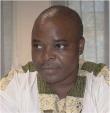The Independent Newsweekly
| National
Catholic Reporter
The Independent Newsweekly |
| Global Perspective |
| July 27, 2004 |
Vol.
2, No. 14
|

Joe Komakoma is a priest from Lusaka, Zambia, where he directs the Catholic Center for Justice Development and Peace. |
No blissful retirement for struggling seniors in ZambiaBy Joe Komakoma LUSAKA, Zambia -- When I travel abroad, especially to Europe and North America, I am amazed at the sheer numbers of elderly people that I see. It seems every other person is age 65 and above. Furthermore, they are going happily about their business. They zoom around in plush tourist buses. You see them at leisure in public places. Then you discover that they are given all sorts of services by the state to make them comfortable. They have, for instance, reduced fares and reserved seats on public transport. At home here in Zambia, where life expectancy at birth now is estimated to be as low as 35 years, the story is different. Elderly people are few and far between. Reaching 50 years of age is considered a great milestone. It elevates you to near "dinosaur" status. A combination of factors has led to this sad state of affairs. High on the agenda of these factors is the HIV/Aids pandemic. In the past few years, the country has lost thousands of people between 18 and 49 years of age. Added to this is Zambia's classification as a Highly Indebted Poor Country (HIPC). Eighty percent of the population live in abject poverty, subsisting on a mere US$2 a day. These socioeconomic problems have a negative effect on families, but more especially on elderly people. Families have lost their legendary ability to absorb members of the extended family. With families struggling to survive, the elderly tend to be forgotten. This is where the nightmare begins for our senior citizens. There is nothing like blissful retirement. It is not unusual to see elderly people going out to look for means to sustain themselves. If you were an elderly person living in Zambia today, chances are good that you have lost one or more of your children to the HIV/AIDS pandemic. That means orphaned grandchildren end up in your house. You revert to the life of parenting once again. But you assume these added responsibilities without corresponding assistance. You may have a pension, but it is likely a pittance, not worth going to collect since your transport costs may be higher than the cash you will be given. How do you then look after your grandchildren? Even when you may not have extra mouths to feed, as an elderly person you are up against many odds. The country does not have a clear policy of caring for retired people. The plight of the elderly grabbed national headlines here recently when Mirriam Mokola, 77, the mother of the current president Levy Mwanawasa, died following a road accident. She died from serious burns she received when the rickety public minibus she was riding caught fire. Mrs. Mokola would probably be alive today if she had been younger and had the agility to escape from the vehicle when it caught fire. She may also have escaped in time had she been on a vantage seat. In many countries, the seats nearest the doors are reserved for the elderly and physically challenged. Her death was a timely reminder of the conditions all senior citizens in Zambia face. They are left to fend for themselves with little or no income and no one to look after them. With the onerous task of trying to eek out a living on their own, a good number of them are reduced to living as scavengers looking for food and clothes here and there. We hear a lot about orphans, street kids and abused children, because they have very strong lobbies, which make the nation take note of their situation. Not so for the old people. With few strong lobbies to bring their plight to the fore, the suffering of elderly people goes quietly. We are neglecting our duty to take special care of our old people. Not only are they repositories of wisdom, culture and history, they are also great role models. |
| Copyright
© 2004 The National Catholic Reporter Publishing Company, 115
E. Armour Blvd., Kansas City, MO 64111
TEL: 1-816-531-0538 FAX: 1-816-968-2280 |